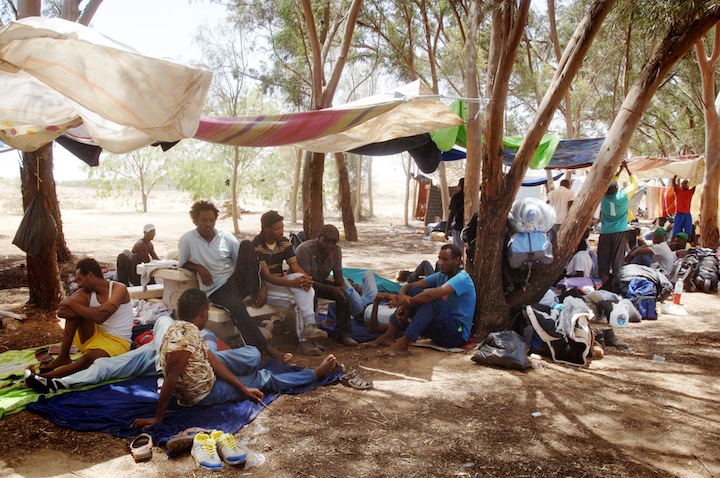TEL AVIV (JTA) — For two years, Israel’s government has been encouraging its population of African migrants to leave the country.
But when 1,000 Eritreans and Sudanese marched on Israel’s southwestern border on Friday, they couldn’t get through to Egypt. After two days of camping out in protest on the border, the hundreds who remained were arrested Sunday by Israeli authorities and placed in prison.
“We are a state,” Interior Ministry spokeswoman Sabin Haddad told JTA. “To just go to the border and cross, you can’t do that. Whoever wants to leave needs to do it according to protocol.”
When it allows migrants to leave, Israel will only permit their return to their home countries — where they would face repressive regimes — or to one of a few third-party countries whose identity Israel has declined to publicize. Israel provides grants of $3,500 to those who leave.
For those who remain in Israel, the government has built a detention facility near the Egyptian border, called Holot, that now houses more than 2,000 people. Detainees receive food, shelter and health care, but their freedom of movement is restricted as they must stand for roll call three times daily. The detainees have no release date. Failure to show for roll call, or refusal to answer the summons to Holot, are punishable with prison time.
“It was horrible to be in Holot and to be in prison,” said Philemon Rezene, 26, an Eritrean chosen to represent the protesters at a Tel Aviv news conference Sunday. “They had a very miserable life. There was a shortage of food, a shortage of sanitation, a shortage of medical care. They were always under strict control. They wanted at least to be free in an open area.”
The migrants’ march on the border is the latest stage in their conflict with the Israeli government. The migrants are seeking asylum from Eritrea and Sudan, which are ruled by repressive regimes.
But Israel says they are economic migrants seeking a higher standard of living, and it fenced off its border with Egypt in 2012 to prevent future migrants from entering. Anyone who crosses Israel’s border illegally now faces a year in prison.
Last year, Israel approved the financial grants for voluntary departure and opened the Holot facility. Approximately 3,000 out of Israel’s African migrant population of 60,000 have chosen to voluntarily depart.
Chafing at their restrictions, the detainees who marched toward the Egyptian border last week aimed to cross into Egypt and wait there for assistance from the United Nations high commissioner for refugees, according to Liat Bolzman, an Israeli who accompanied them.
Blocked by Israeli border guards, the protesters set up camp on the border, sheltering themselves with sheets, and surviving on food and water brought by supporters.
Two days after the initial march, units of Israeli immigration police and border guards forcibly dispersed the camp and sent the remaining protesters to Saharonim Prison, next to Holot. Bolzman said six protesters were injured during the operation.
“They were ready to cross,” she said. “It’s better than sitting in the detention center for they don’t know how much time. They said we can’t live like this anymore, we’re ready to take this risk and cross the border rather than be here.”
But though the migrants say they are fed up with Israel, crossing the border and receiving U.N. help in Egypt may not be realistic.
Egypt’s Sinai Peninsula is known among migrants for harrowing stories of kidnapping and torture. And the representative in Israel of the U.N. high commissioner for refugees said that migrants who cross the border without proper documentation should not expect prompt assistance from the United Nations.
“In order to make this possible, you can’t just start marching for the border,” said the representative, Walpurga Englbrecht, while also urging Israel to improve conditions for migrants. “You cannot just assume everything will be arranged at the end if there are no arrangements made beforehand. If you go to another country, you need a passport. You need an entry visa.”
Anat Ovadia, spokeswoman for Israel’s Hotline for Migrant Workers, an aid organization, suggested that the goal of the march was more to gain Israeli sympathy for the migrants, not for them to cross the border.
“This step was a protest step to get Israel’s attention and get U.N. attention,” Ovadia said. “It’s a testament to how much Israel is despairing them.”
JTA has documented Jewish history in real-time for over a century. Keep our journalism strong by joining us in supporting independent, award-winning reporting.






